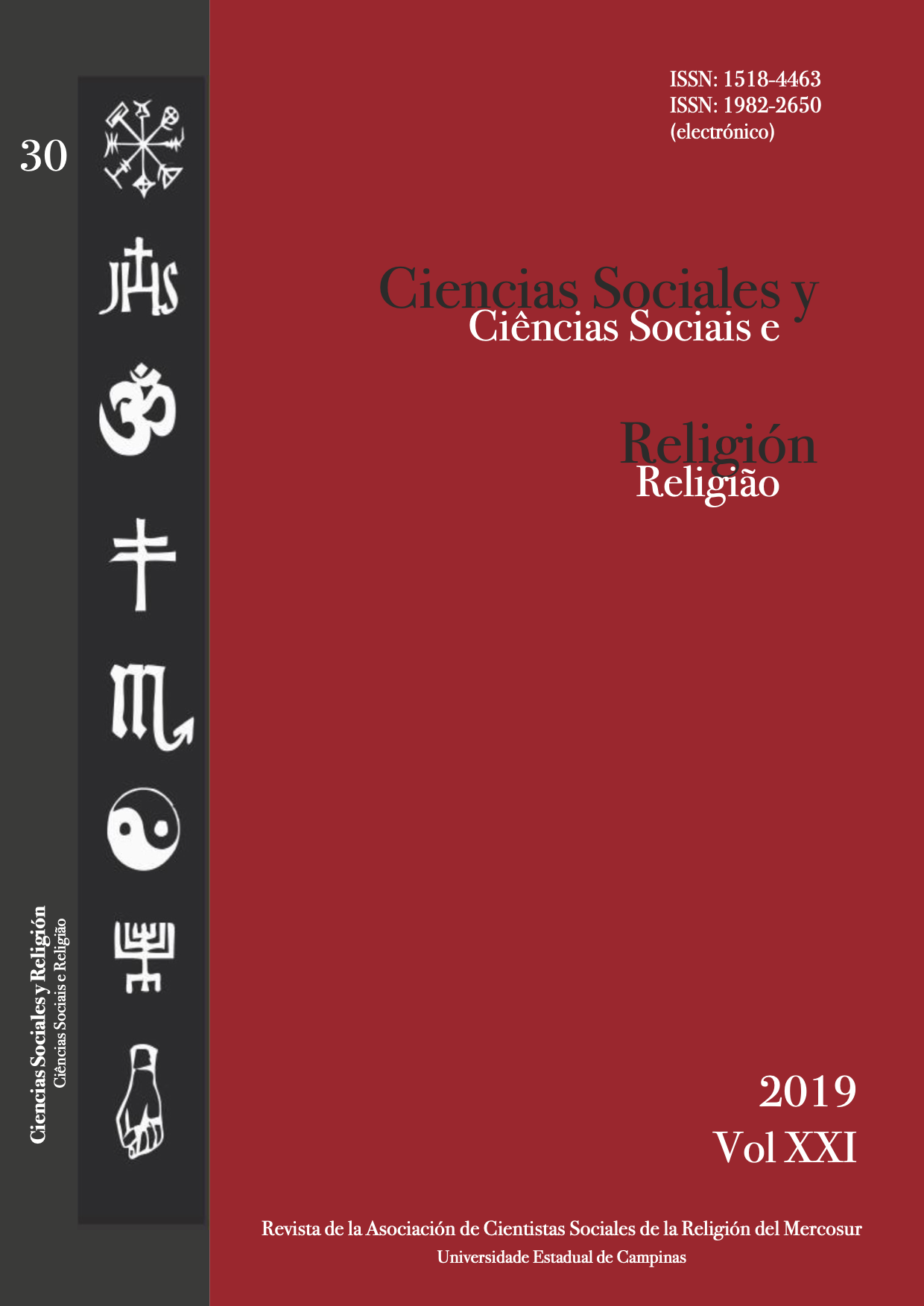Abstract
This article sets out to describe women’s religious classes taught in a mosque in the city of Buenos Aires between 2014 and 2015. We first outline the principles and ethical-religious values transmitted in them. We then go on to analyze the dynamics and characteristics that configure this space of learning and socialization. We inquire into the relationship between knowledge and "good behavior" (adab), paying special attention to the meanings built around ethical principles in Islam, personal experience and the practice of worship. We conclude with some thoughts about the anthropologist’s involvement during the fieldwork and the fruitful challenges that arise between religious studies and gender studies.
References
ABU-LUGHOD, Lila. “Do muslim women really need saving? Anthropological reflections on cultural relativism and its others”, American Anthropologist, 104 (3): 783-790, 2002.
ABU-LUGHOD, Lila. “The cross-publics of ethnography: the case of the ‘muslim-woman’”. American Ethnologist, 43 (4): 595-608, 2016.
ASAD, Talal. Genealogies of Religion: Discipline and Reasons of Power in Christianity and Islam. Baltimore: Johns Hopkins University Press, 1993 [1982].
BHABHA, Homi. “The Other Question”, Screen, 24 (6): 18-36, 1983.
BRACKE, Sarah. “Author(iz)ing Agency: Feminist Scholars Making Sense of Women's Involvement in Religious ‘Fundamentalist' Movements’”, European Journal of Women's Studies, 10: 335-346, 2003.
BRACKE, Sarah. “Conjugating the modern religious, conceptualizing female religious agency: Contours of a post-secular conjuncture”, Theory Culture Society, 25 (6): 51-67, 2008.
BUTLER, Judith, “Dar cuenta de sí mismo”, Dar cuenta de sí mismo: violencia ética y responsabilidad. Buenos Aires: Amorrortu, pp. 13-60, 2005.
CAROZZI, M. Julia y Frigerio, Alejandro. “Los estudios de la conversión a nuevos movimientos religiosos: Perspectivas, metodologías y hallazgos” M.J. Carozzi y A. Frigerio (comps.) El Estudio Científico de la Religión a fines del siglo XX. Bs. As: CEAL, pp. 17-53, 1994.
CHINNICI, Fernando Martín. Dime como haces Da’wah y te diré quién eres. Introducción a la difusión del islam en la Argentina. Ponencia presentada en I Jornadas Interdisciplinarias de Jóvenes Investigadores en Ciencias Sociales, IDAES/UNSAM, mayo 2013.
COOKE, Miriam. “Developing the Muslimwoman”, Journal of Feminist Studies in Religion, 24 (1): 91-99, 2008.
CSORDAS, Thomas. “Modos somáticos de atención”, S. Citro (Coord.) Cuerpos Plurales. Antropología de y desde los cuerpos. Buenos Aires: Biblos, pp. 83-104, 2011.
DOLAR, Mladen. “La política de la voz”, Una voz y nada más. Buenos Aires: Manantial, pp. 129-152, 2007.
FARAG, Iman. “Private Lives, Public Affairs: the use of adab”, A. Salvatore (Ed.) Muslim Traditions and Modern Techniques of Power. Münster: Lit Verlag, pp. 93-120, 2001.
FERREIRA, Francirosy. “A Teatralização do sagrado islâmico: a palavra, a voz e o gesto”, Revista Religión y Sociedad, 29 (1): 95-125, 2009.
FERREIRA, Francirosy. “Diálogos sobre o uso do véu (hijab): empoderamento, identidade e religiosidade”, Perspectivas, 43: 183-198, 2013.
FOUCAULT, Michel. Tecnologías del Yo y otros textos afines. Barcelona: Paidós, 1990.
GARCÍA SOMOZA, Mari-Sol. Entre Fátima et Evita: Identités, espaces de participation et de sociabilités religieuses des femmes musulmanes en Argentine, Tesis de doctorado, Université Paris Descartes-Universidad de Buenos Aires, 2017.
GUBER, Rosana. La etnografía. Método, campo y reflexividad. Buenos Aires: Siglo XXI, 2011.
HAERI, Niloofar. “The sincere subject: Mediation and interiority among a group of Muslim women in Iran”, HAU, Journal of Ethnographic Theory, 7 (1): 139-161, 2017.
MAHMOOD, Saba. Politics of Piety: The Islamic Revival and the Feminist Subject. New York & United Kingdom: Princenton University Press & Oxford University Press, 2012 [2005].
MC LARNEY, Ellen. “The islamic public sphere and the discipline of adab”, International Journal of Middle East Studies, 43: 429-449, 2011.
MERLEAU-PONTY, Maurice. Fenomenología de la percepción. Buenos Aires: Planeta Agostini, 1993 [1945].
PAUR, Jasbir. “I would rather be a cyborg than a goddess: intersectionality, assemblage, and affective politics”, Meri Tum, 8 (2): 371-390, 2013.
RABINI, Magdalena. “Cuerpo y tradición en el ritual del salat. El caso de las mujeres musulmanas en Buenos Aires”, Journal of the Sociology and Theory of Religion, 5: 118-134, 2016.
RAMOS, Alcida. “Por una antropología ecuménica”, A. GRIMSON, S. MERENSON y G. NOEL (Comps.) Antropología ahora: Debates sobre la alteridad. Buenos Aires: Siglo XXI, pp. 97-124, 2011.
SCOTT, Joan. “Experiencia”, La Ventana, 13: 42-73, 2001.
TAYLOR, Jodie. “The intimate insider: negotiating the Ethics of friendship when doing insider research”, Qualitative Research, 11 (1): 3-22, 2011.
TOPAL, Semiha. “Female Muslim subjectivity in the secular public sphere: Hijab and ritual prayer as ‘technologies of the self’”, Social Compass, 64 (4): 582-596, 2017.
VALCARCEL, Mayra. “Sierva de Allah: Cuerpo, Género e Islam”, Revista Cultura y Religión, vol.8 (2): 54-82, 2014.
VALCARCEL, Mayra. “Construcciones y trayectorias identitarias de mujeres que profesan el islam en Argentina” Clivajes. Revista de Ciencias Sociales, 3 (6): 31-57, 2016.
ZINE, Jasmin. “Unveiled Sentiments: Gendered Islamophobia and Experiences of Veiling among Muslim Girls in a Canadian Islamic School”, Equality and Excellence in Education, 39: 239-252, 2006.

This work is licensed under a Creative Commons Attribution-NonCommercial-ShareAlike 4.0 International License.
Copyright (c) 2019 ConfiguraçõesMayra S. Valcarcel
